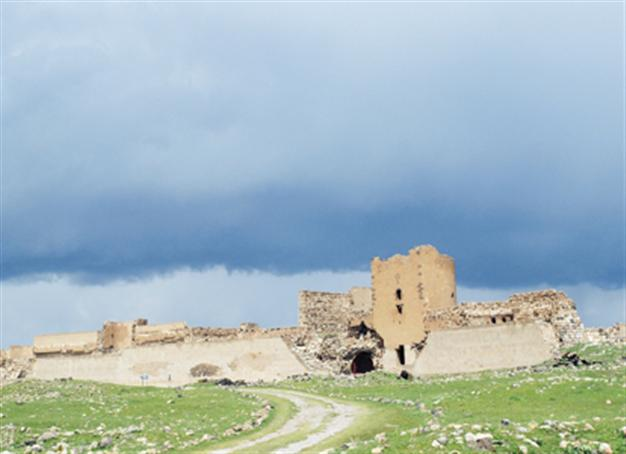Ani, the city of 40 gates with beautiful views, endless plains, hills and clouds
WILCO VAN HERPEN - wilcovanherpen@yahoo.co.uk

The Ani ruins in the eastern province of Kars is situated in one of the most isolated areas in Turkey on the border between Turkey and Armenia. Photo by Wilco Van Herpen
There are a lot of places in Turkey that take your breath away, but it is after visiting Ani that you really realize the greatness of this country. If you visit or live in Turkey, there are some places you have to see. Places like Pamukkale, Cappadocia, Ephesus or Safranbolu are a must; however, there are at least a thousand more places I would like to recommend. But Ani is different. It is situated in one of the most isolated areas in Turkey. It is adventure, it is history, it is drama and it is, as a result, hugely impressive.
You can find Ani on the border of Turkey and Armenia, which meant in the past it was very difficult to visit this old city. While palaces and castles were generally built at very strategic points, Ani is situated in the middle of a plain. Not easy to defend, I think. Today, a little stream is the natural border between Armenia and Turkey. Like most visitors who visit the area, I stayed in Kars since there are no hotels in the village next to Ani, which is poor and does not benefit financially from the ancient city. By car it takes an hour to reach Ani, at least if you do not lose your way in Kars. Since there are almost no signposts in Kars, your adventure starts once you leave the hotel. I cannot remember how many times I turned left or right before I finally reached the town’s outskirts. The road was in bad condition and I had to slalom around the potholes. Finally I saw the walls which surround Ani and I was there.
The first thing you see when you walk through the entrance gate are stones, everywhere there are stones. Those stones are silent reminders of what once used to be a highly influential place: the capital of the Armenian empire between where 100,000 and 200,000 people used to live.
I visited Ani during early spring. Actually I was one month too early. The best time is May when Ani is covered with a carpet of thousands and thousands of flowers. Entering the “city of the 40 gates” in front of me I see a vast plain. Scattered around are the remains of churches, houses, the memories of an entire city. Despite efforts to conserve and restore the site, according to many, even the experts failed to be successful in doing so. By using the wrong techniques and materials, they sometimes damaged more then they actually repaired.
Ani is a huge place and to see everything you would have to spend at least two days there. Of course, it is possible to get a brief overview by running around and taking a couple of snapshots before continuing on your way, but if you want to experience Ani, then I advise you to stay another day.
The first day, just walk around and look at some of the magnificent remains of the churches and cathedrals. Soak in all the information you can as there are some nice stories and explanations about Ani. Then there is the beautiful mosque and some remains of houses, bath houses and more.
The next day, go back to the “city of the thousand churches” and stroll around with the information you now have about Ani. Find a nice place and sit down. Spend some time there. Look at the beautiful landscape, the hills, the endless plain and the clouds drifting over your head; free like a bird. Think about the history of this place, what a rich and lively city it was once upon a time. Staying for an extended period of time gives you the opportunity to delve deeper into the landscape and the surroundings. You notice details you did not see before, you remember a story your guide told you and suddenly it is as if this story comes alive. You travel back in time and the city is even more beautiful than you expected.
Ani has seen a lot of rulers. There were the Armenians, the Byzantines, the Selçuks, the Ottomans, the Russians and, finally, the Turks. It all started in 956 when King Ashot III moved the Armenian capital to Ani. When the Armenian Catholics decided to make Ani their capital, too, Ani became more and more important to the region. There were a thousand churches and each one was more beautiful decorated with elaborate frescos then the next.
In 1064, the Selçuk Turks took over the city after a 25-day siege. From that day on, Ani would never be as powerful as it had been and the great city deteriorated into a provincial city. The final blow was given by the Mongols who made Ani into a backwater, ensuring that it slowly became a ghost city. It is difficult to believe that Ani was once one of the most important and prettiest places in this region.
What once was the glorious “City of the 40 gates” became an old woman. She still wants to tell you her story but you have to be more patient then before: “Can you come back tomorrow so I can tell you the whole story?” she whispers
















